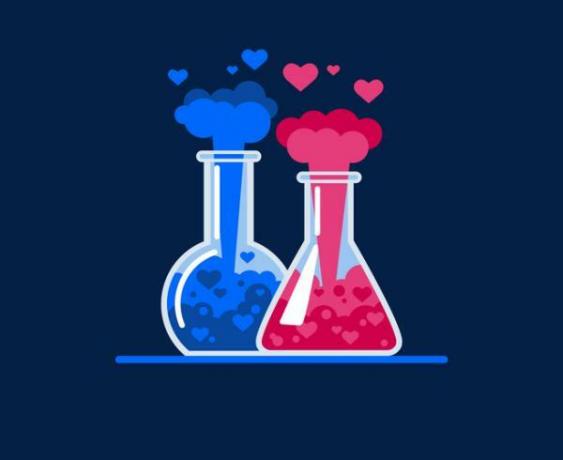
Many people spend part of their life looking for someone to share it with, someone who believes in them that feeling of adolescent in love and hormonal and that makes them feel butterflies in the stomach. However, there are very few who manage to experience these sensations and for this reason we do not see couples less in love than those who do.
Love is a very complex emotion described as a feeling of intense emotional and sexual attraction towards a person with whom you want to share a life in common. Empedocles identified it with the force that tends towards union, as opposed to separation embodied in hatred.
But do we really know all the processes involved in being in love? At Psychology-Online, we want you to learn what happens to you every time you fall in love. How your body and mind reacts during this period according to science, namely: the chemistry of love.
Index
- What produces infatuation biologically
- Reactions experienced in falling in love
- The neurochemistry of love
- The hormones of love
What produces infatuation biologically.
According to Chóliz, the act of falling in love it is only one phase (although considered the most intense) of romantic love. This first phase of love relationships is initiated by the perception and feeling of pleasure that collect our senses as a result of the presence or thought of a certain person.
The experience of falling in love can be scientifically studied from a biological basis, where neurotransmitters and hormones are of great importance. It has been proven that, during falling in love, people undergo a series of changes in their body. Levels hormones are altered, the neurotransmitter release, stress levels are modified. These changes in the body are manifested in a series of symptoms which are externally expressed.
Reactions experienced in falling in love.
It is very common that people tend to act with similar attitudes when they fall in love, this is a consequence of biological changesI know what we experience when we fall in love. It is usually observed in the person in love:
- An intense desire for intimacy and to the union with the loved one.
- Need reciprocity.
- Fear to rejection.
- Frequent thoughts about the individual.
- Loss of concentration.
- Increased physiological activity of the organism in the presence of the other person.
- Idealization of the individual with whom you are in love.
- Increased heart rate, from sweating, from blood pressure.
- Peristaltic bowel movements or better known as "butterflies in the stomach".
Here you will find more information about what it feels like to be in love for real.
The neurochemistry of love.
Neurotransmitters and hormones are the main causes of the sensations experienced in falling in love. At present, the following chemical compounds have been found to be involved in love:
- Dopamine: it influences both sexual desire and the brain's reward system, so its appearance allows us to associate certain stimuli. Thanks to the dopamine we associate the presence of a person with pleasant sensations and feelings. Therefore, when we see a loved one, our brain will automatically react by providing us with a feeling of happiness.
- Noradrenaline: neurotransmitter which is associated with physiological responses (increased heart rate). Therefore, when this transmitter is released, the release of oxytocin and dopamine is facilitated. Again, a situation of association would be created in the person. For example: when I see a person that I like (stimulus), my heart rate accelerates (noradrenaline) and a pleasant sensation invades me (dopamine).
- Serotonin: it is a neurotransmitter which is associated with the regulation of both mood, appetite, sleep and some other biological processes. The implication of the serotonin in the process of falling in love, it is present when a person in love reports that she is less hungry and sleepy.
- Cortisol: It has been observed that people in love increase considerably the level of cortisol, which is a hormone related to stress.
- Phenylethylamine: it is neither more nor less than an enhancer. It is responsible for increasing the effects produced by dopamine and noreadrenaline.
- Sex hormones: In both men and women, sex hormones modulate dopamine activity in the brain. These hormones influence the process of falling in love in the part related to sexual desire, since thanks to them sexual characteristics and functions are developed.
- The hormones of love: are the oxytocin and the vasopressin. As a result of their great importance in this process of falling in love, we proceed to describe them in more detail in the next section.
The hormones of love.
The hormones of love are neither more nor less than the hormones known to all as oxytocin Y vasopressin. Both are synthesized in the hypothalamus. These hormones are considered to be responsible for the relational process of the attachment. In this article you will find what is attachment and the different types of attachment that exist. However, beyond the attachment that a baby can produce towards her caregivers, adults can also develop it towards other adults. Arguably, it is the basis of any affective relationship.
These two hormones produce a person feeling of well-being and relaxation when he is in the presence of the person with whom he shares this bond of attachment. That is why its influence on the love process is considered so important.
On the other hand, they have other functions in our body, oxytocin being a necessary hormone for childbirth and breastfeeding and vasopressin, a hormone necessary for vasoconstriction and reabsorption of fluid by the kidneys.
This article is merely informative, in Psychology-Online we do not have the power to make a diagnosis or recommend a treatment. We invite you to go to a psychologist to treat your particular case.
If you want to read more articles similar to The chemistry of love: is there a scientific formula?, we recommend that you enter our category of Feelings.
Bibliography
- Camacho-Arroyo, I. (2011). That love? it is. As you see, 10-14.
- Figueroba, A. What is it to be in love? The chemistry of love: Oxytocin, dopamine and other hormones and neurotransmitters are the keys to falling in love.
- Montañés, M. C., & Iñiguez, C. G. (2002). Social emotions: infatuation, jealousy, envy and empathy.


